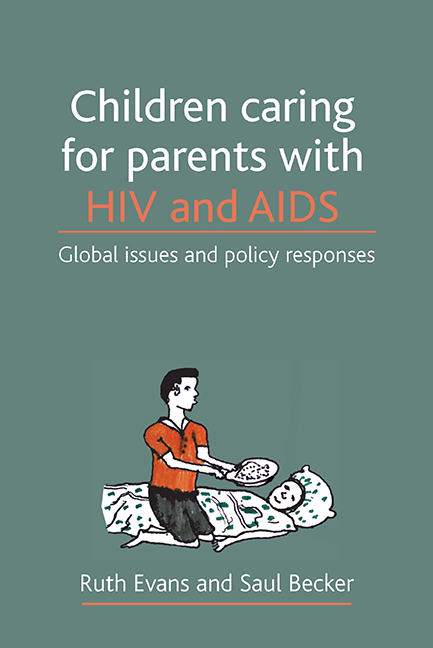Book contents
- Frontmatter
- Dedication
- Contents
- List of tables, figures and boxes
- Preface
- one Children’s and young people’s caring responsibilities within the family
- two HIV and the family
- three Reflexivity, methodology and ethics: the research process
- four Living with HIV and the effects on family life: parents’ narratives
- five Children’s and young people’s care work in households affected by HIV and AIDS
- six Resilience and impacts of care work for individual young people and their families
- seven Resilience and impacts of young people’s care work within the school and wider community
- eight The role of formal safety nets in building children’s and families’ resilience
- nine Global and local processes influencing young people’s caring roles in families affected by HIV and AIDS
- ten Responding to the support needs of children and young people caring for parents with HIV
- Bibliography
- Index
seven - Resilience and impacts of young people’s care work within the school and wider community
Published online by Cambridge University Press: 21 January 2022
- Frontmatter
- Dedication
- Contents
- List of tables, figures and boxes
- Preface
- one Children’s and young people’s caring responsibilities within the family
- two HIV and the family
- three Reflexivity, methodology and ethics: the research process
- four Living with HIV and the effects on family life: parents’ narratives
- five Children’s and young people’s care work in households affected by HIV and AIDS
- six Resilience and impacts of care work for individual young people and their families
- seven Resilience and impacts of young people’s care work within the school and wider community
- eight The role of formal safety nets in building children’s and families’ resilience
- nine Global and local processes influencing young people’s caring roles in families affected by HIV and AIDS
- ten Responding to the support needs of children and young people caring for parents with HIV
- Bibliography
- Index
Summary
Previous research with young carers in the global North has suggested that young caregiving may have negative impacts on children's educational performance and school attendance as well as restricting children's opportunities for developing peer friendships and taking part in leisure and social activities in the wider community (Bilsborrow, 1992; Aldridge and Becker, 1993; Dearden and Becker, 1995; Marsden, 1995; Dearden and Becker, 1998; Crabtree and Warner, 1999; Thomas et al, 2003; Dearden and Becker, 2004). Following on from the previous chapter, this chapter discusses resilience and impacts of children's care work in families affected by HIV/AIDS within the domains of the school and wider community. We explore the ways that children and parents/relatives with HIV draw on social ties, networks and informal safety nets in the school environment and community in order to deal with household crisis and mitigate their vulnerability.
Resilience and impacts within the school environment
The literature on orphans and vulnerable children in the South has documented many negative impacts of the HIV/AIDS epidemic on children's educational performance and attendance (Kelly, 2005; Robson and Kanyanta, 2007b). Data from 20 Sub-Saharan African countries show that children aged 10-14 who have lost one or both parents are less likely to be in school than their non-orphaned peers (Rispel with Letlape and Metcalf, 2006). However, other studies have provided a less conclusive picture of the school attendance of orphans compared with non-orphans (Guest, 2001; Ainsworth and Filmer, 2002; Gould and Huber, 2003). Ainsworth and Filmer (2002) compared enrolment levels of orphans with other children in 28 countries and found that enrolment was related to income level and questioned whether orphan status should be used to target educational assistance (Kelly, 2005). Similarly, Gould and Huber's large study in Tanzania found that although HIV/AIDS affected children's school attendance, some children demonstrated considerable educational resilience:
Just as many children from poor homes survive and do well in school, many children from HIV/AIDS affected households also survive and do well. Coming from an HIV/AIDS affected household is neither a necessary or a sufficient condition for irregular attendance, dropout or never being enrolled. (Gould and Huber, 2003: 35)
Research suggests that children, particularly girls, may be withdrawn from school to care for sick family members (Kelly, 2005).
- Type
- Chapter
- Information
- Children Caring for Parents with HIV and AIDSGlobal Issues and Policy Responses, pp. 175 - 200Publisher: Bristol University PressPrint publication year: 2009



